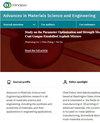车削 SKD 11 淬火钢:使用田口方法对表面粗糙度和材料去除率的实验研究
4区 材料科学
Q2 Engineering
引用次数: 0
摘要
热处理钢因其高强度和其他理想的机械性能而广泛应用于工业领域。磨削需要大量动力,成本高昂,通常用于淬火加工。近来,在某些应用中,硬加工已成为磨削的可行替代方法。在这项研究中,使用硬质合金刀片(CNMA 120408-KR3215)对 SKD 11(53 HRC)淬火钢进行了车削加工。使用 L9 正交阵列共完成了九次加工测试。本研究考虑的响应变量是表面粗糙度 (Ra) 和材料去除率 (MRR)。信噪比分析表明,要达到理想的表面粗糙度,最佳的切削加工参数组合为切削速度 119 m/min、进给量 0.11 mm/rev、切削深度 0.2 mm。通过方差分析确定了各工艺参数对硬质合金刀具-工件组合加工性能的影响。切削深度对 MRR 的影响最大(57.33%),而进给量对 Ra 的影响最大(82.15%)。此外,还进行了可取性函数分析(DFA),以优化多重响应。DFA 表明,要获得令人满意的输出参数响应,较高的切削速度和切削深度范围以及较低的进给量范围是可取的;因此,分析结果表明,切削速度为 189 m/min、进给量为 0.11 mm/rev、切削深度为 0.5 mm 可以获得 0.971 μm 的良好 Ra 值和 10.248 cm3/min 的 MRR 值。在硬加工中,切削速度对表面光洁度的影响大于进给速度。本文章由计算机程序翻译,如有差异,请以英文原文为准。
Turning SKD 11 Hardened Steel: An Experimental Study of Surface Roughness and Material Removal Rate Using Taguchi Method
Heat-treated steel is widely used in industrial applications due to its high strength and other desirable mechanical qualities. Grinding, which requires a lot of power and is expensive, is typically used to harden machining. In recent times, hard machining has emerged as a viable alternative to grind in select applications. In this investigation, turning operations with a carbide insert (CNMA 120408-KR3215) were carried out on SKD 11 (53 HRC) hardened steel. A total of nine machining tests were completed using the L9 orthogonal array. The response variables considered in this study were surface roughness (Ra) and material removal rate (MRR). The analysis of the signal to noise ratio reveals that the optimal combination of cutting process parameters for achieving a desired surface roughness consists of a cutting speed of 119 m/min, a feed rate of 0.11 mm/rev, and a depth of cut of 0.2 mm. The contribution of each process parameter to the machining performance of the carbide tool-work piece combination is determined through the use of ANOVA. Depth of cut has the greatest impact (57.33%) to MRR, while feed rate has the highest contribution (82.15%) to Ra. Moreover, desirability function analysis (DFA) was conducted to optimize the multiple responses. DFA suggested that, to attain a satisfactory response to the output parameters, higher range of cutting speed, depth of cut, and lower range of feed rate are appreciable; therefore, the analytical findings suggest that a cutting speed of 189 m/min, feed rate of 0.11 mm/rev, and a depth of cut of 0.5 mm can induce a favorable Ra of 0.971 μm and MRR of 10.248 cm3/min. In hard machining, cutting speed has a bigger influence on surface finish than feed rate.
求助全文
通过发布文献求助,成功后即可免费获取论文全文。
去求助
来源期刊

Advances in Materials Science and Engineering
Materials Science-General Materials Science
CiteScore
3.30
自引率
0.00%
发文量
0
审稿时长
4-8 weeks
期刊介绍:
Advances in Materials Science and Engineering is a broad scope journal that publishes articles in all areas of materials science and engineering including, but not limited to:
-Chemistry and fundamental properties of matter
-Material synthesis, fabrication, manufacture, and processing
-Magnetic, electrical, thermal, and optical properties of materials
-Strength, durability, and mechanical behaviour of materials
-Consideration of materials in structural design, modelling, and engineering
-Green and renewable materials, and consideration of materials’ life cycles
-Materials in specialist applications (such as medicine, energy, aerospace, and nanotechnology)
 求助内容:
求助内容: 应助结果提醒方式:
应助结果提醒方式:


